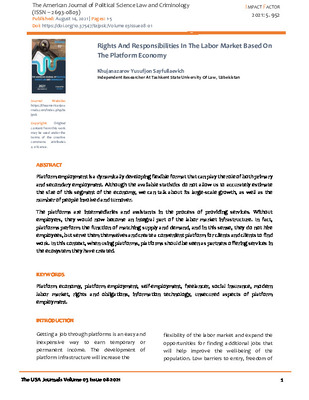Rights And Responsibilities In The Labor Market Based On The Platform Economy
Abstract
Platform employment is a dynamically developing flexible format that can play the role of both primary and secondary employment. Although the available statistics do not allow us to accurately estimate the size of this segment of the economy, we can talk about its large-scale growth, as well as the number of people involved and turnover. The platforms are intermediaries and assistants in the process of providing services. Without employers, they would now become an integral part of the labor market infrastructure. In fact, platforms perform the function of matching supply and demand, and in this sense, they do not hire employees, but serve them themselves and create a convenient platform for clients and clients to find work. In this context, when using platforms, platforms should be seen as partners offering services in the ecosystem they have created.

Downloads
Independent Researcher
Abstract
Platform employment is a dynamically developing flexible format that can play the role of both primary and secondary employment. Although the available statistics do not allow us to accurately estimate the size of this segment of the economy, we can talk about its large-scale growth, as well as the number of people involved and turnover. The platforms are intermediaries and assistants in the process of providing services. Without employers, they would now become an integral part of the labor market infrastructure. In fact, platforms perform the function of matching supply and demand, and in this sense, they do not hire employees, but serve them themselves and create a convenient platform for clients and clients to find work. In this context, when using platforms, platforms should be seen as partners offering services in the ecosystem they have created.
References
Law of the Republic of Uzbekistan “On employment of the population”.
Decree of the President of the Republic of Uzbekistan No.DP-5598 dated 13.12.2018 "On additional measures to introduce the digital economy, electronic government, as well as information systems in the state administration of the Republic of Uzbekistan."
Resolution of the President of the Republic of Uzbekistan No. RP-4699 of 28.04.2020 "On measures for the widespread introduction of the digital economy and electronic government."
Resolution of the President of the Republic of Uzbekistan No. RP-4321 dated 05/18/2019 “On measures to further improve the infrastructure of the digital economy and the“ Electronic government ”system."
Resolution of the Cabinet of Ministers of the Republic of Uzbekistan No. 373 of 15.06.2021 "On measures to further improve the rating system for assessing the state of development of the digital economy and electronic government".
World Employment and Social Outlook 2021 (2021) The role of digital labour platforms in transforming the world of work. International Labour Office, Geneva: ILO, 2021.
Zhou I (2020) Digital labour platforms and labour protection in China. ILO Working Paper No. 11.
Todoli-Signes A (2020) Platform work: protection through case law while the law is amended. Peer Country Comments Paper. Spain.
Sociaal-Economische Raad (2020) Hoe werkt de platformeconomie [How does the platform economy work?]
Schmidlechner, L, Peruffo, E, Contreras, R & Molinuevo, D 2017, Coordination by platforms: literature review, European Foundation for the Improvement of Living and Working Conditions, Dublin, viewed 21 May 2021.





